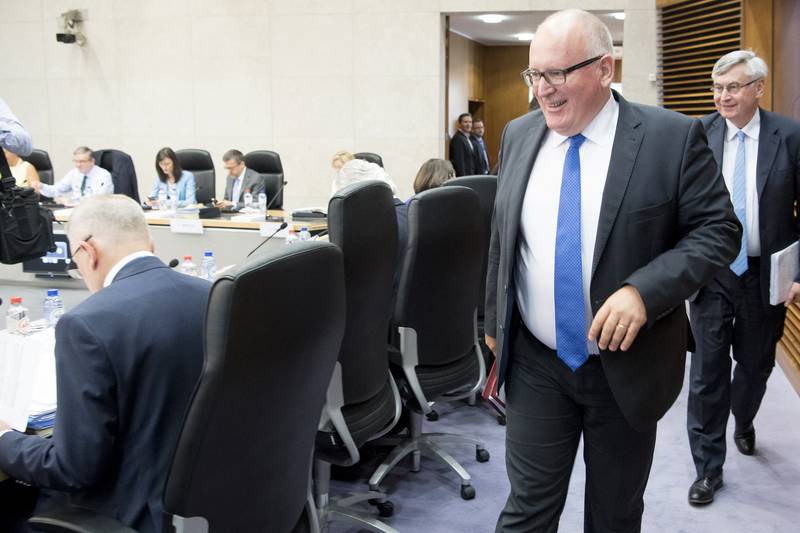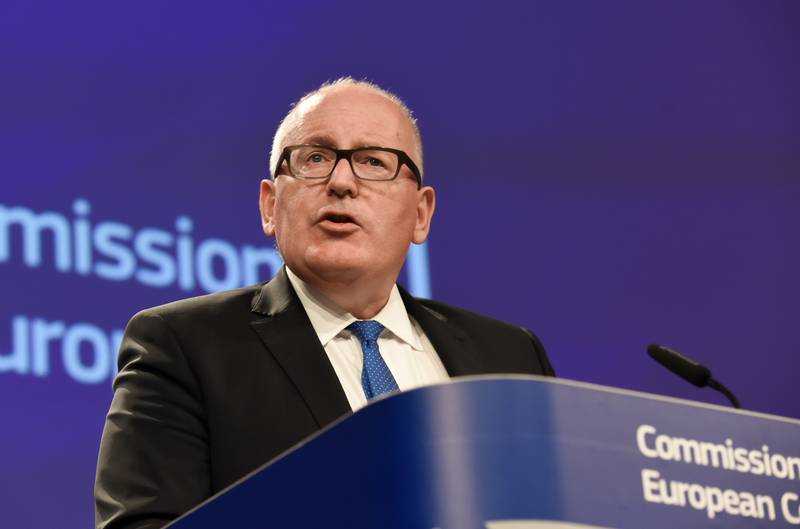Frans Timmermans Showed Poland the Door
Adelina Marini, July 20, 2017

The European Commission today discussed the EU's "nuclear option" regarding the most recent decisions of the Polish government with which the rule of law would be virtually completely destroyed. "Given the latest developments, we are coming very close to triggering article 7", said the Commission's first Vice President Frans Timmermans (Netherlands, Socialists and Democrats), who is in charge of the rule of law. On Wednesday, the College of Commissioners discussed the latest situation in Poland that arose after the government proposed a package of legislative measures that, in Mr Timmermans' words, individually would suffice to undermine the independence of the judiciary, and would in a package "abolish any remaining judicial independence and put the judiciary under full political control of the government".
These are four legislative acts, some of which have already been adopted by parliament. These are the law for the National School of Judicial System (enacted), the law for the National Council of the Judiciary - a body similar to the Bulgarian SJC (approved and pending signature by the president), the law on the organisation of ordinary courts (approved and pending signature by the president), and the Supreme Court Act (still in parliamentary procedure). This is yet another step of the Polish extreme conservative government of Law and Justice after removing the independence of the Constitutional Tribunal, for which the European Commission has for the first time triggered the rule of law protection mechanism.
Under this mechanism, the EC has so far sent to Warsaw an opinion and two recommendations regarding the Constitutional Tribunal. According to the Commission, the tribunal's composition no longer complies with the Constitution, the publication of its decisions is no longer in its hands, some of the judges are lawfully elected but not appointed, whilst others are appointed but not lawfully elected. Thus, the legitimacy of the tribunal is seriously undermined, explained the first vice president. Frans Timmermans believes it is possible to get the Council's support and the qualified majority required to trigger Article 7 of the EU Treaty (which foresees suspension of voting rights in the Council) if Poland does not take steps to withdraw the laws in question and does not return to a dialogue with the Commission. He admitted, however, that this majority is not guaranteed.
He recalled that the Commission's concerns are shared by a large number of member states, the European Parliament and also the Council of Europe and the Venice Commission. In the College of Commissioners, support is 100%, he added. It is still unclear when the EC will make such a proposal. Frans Timmermans explained that as soon as these laws come into force, the EC will have reason to do so, but warned that it would be discussed internally when it would be most appropriate to do it. In May, Mr Timmermans discussed the situation in the General Affairs Council and back then received the support of the most important member states. The vice president announced that he would speak with the Estonian rotating presidency to negotiate the most appropriate time to hold the next Council meeting on this subject.
This is unlikely to happen before the start of the next political season as the European institutions are already preparing for the summer break. However, before resorting to Article 7, the EC will prepare the third successive recommendation on the rule of law mechanism for the College meeting next week. The EC is also expected to open infringement procedures at that point. The vice president explained that what is happening in Poland raises concerns for violation of the Polish Constitution but also of the European legislation, as the Polish courts, as practically courts in all member states, act as EU courts. Therefore, the laws prepared concern anyone doing business in or with Poland, as well as ordinary citizens who are simply visiting the country.
Frans Timmermans used the occasion to criticise Poland about intimidating journalists as well. The reason for this was the incident last week when, during the Commission's regular midday press briefing in Brussels, Dorota Bawolek asked for a comment on the situation with democracy in Poland but did not get any, which provoked her to say, "You`d rather talk about a country that is leaving the European Union than about one that is still a member and that, if you refuse to commentate on what is happening, will also be at risk of leaving". The incident was qualified by the Polish national television as a "provocation," and in the social networks Dorota Bawolek was declared a "traitor", "prostitute" and "anti-Polish manipulator". There are also indications of many threats.
The Polsat National Television channel also pronounced her a state traitor. Frans Timmermans called for the threats to end. "What should not be happening is anybody sitting in this room, who wants to ask critical questions of me, would feel a reservation, fear for consequences to do that. That’s not how it works in a free society", he said and quoted the motto of The Washington Post newspaper that in darkness democracy dies. The first vice-President also explained that the situation in Poland is different from the one in Hungary, as Hungary does not talk about a reform that puts the judiciary under the control of a minister in a way that undermines the division of powers.
The EP political groups supported the Commission's actions. EPP President Manfred Weber (Germany) wrote on Twitter that there is no doubt that the government of Law and Justice is trying to abolish the rule of law and that should be stopped. Gianni Pittella (Italy), leader of the second-largest group Socialists and Democrats, said the Polish government is constantly jeopardising the rule of law and the legal basis of democracy. The group welcomes the EC's "swift" reaction. "Should the Polish government and authorities continue to disregard the warning signals from Brussels concerning the independence of the judiciary, the S&D Group considers it requisite the activation of all possible infringement proceedings against Poland for the violation of EU law", Pittella believes.
The leader of the group of Liberals, Guy Verhofstadt (Belgium), also supported the EC's actions. Sven Giegold (Germany), a member of the Greens Group, welcomed the Commission's criticism but warned that they were questionable. "As long as there is no regular EU monitoring of the rule of law in all member states, it is easy for countries such as Poland or Hungary to denounce criticism from Brussels", he said, and called on the EC to analyse the rule of law in all member states using the same parameters. "The EU Commission has to control the rule of law in all EU member states rather than acting as fire fighters when the democratic house is already burning", Sven Giegold added.
With today's warnings, the EC has also stood at the side of the thousands of Poles protesting on Sunday in front of the Supreme Court and Parliament, accusing the government of building a dictatorship. This is also the opinion of the National Council of the Judiciary, according to which Poland is on the verge of dictatorship. According to the government in Warsaw, changes serve democracy and citizens. Justice Minister Zbigniew Ziobro argues that the judicial system is currently completely separated from the mechanisms for democratic control.

Meanwhile, President Andrzej Duda surprisingly presented his own proposal for amendments to the controversial draft law on the appointment of members of the National Council of the Judiciary and threatened to veto the law if they are not adopted. However, Frans Timmermans said that this is not enough, as it is about amending only one of four laws, each of which seriously undermines the rule of law, and in their entirety they are abolishing the rule of law.
Frans Timmermans was emotional in saying that nothing in his political life was more important than the fall of the Iron Curtain and the Berlin Wall, as well as the 2004 enlargement when 10 new countries joined the EU, Poland among them. He promised to do everything in his power to ensure that Poland sticks to a development that respects the rule of law, democracy, openness, media freedom, market economy, opportunities for all.
"This is the clear choice that was made by Poland when they freed themselves from communist oppression. We didn’t do that. The Poles did that themselves, starting in Gdansk. People we can always admire such as Lech Wałęsa. They did themselves. But the EU did help. At the outset Poland was in comparably the same situation as Ukraine economically, socially, politically in some way. Now look at the difference! It’s two worlds of difference perhaps. And part of this is because we had the rule of law, because we had independent judges, because corruption could be tackled by independent courts. That’s why you don’t have oligarchs in Poland. That’s why you don’t have a corrupt society in Poland, which is a scourge for the people of Ukraine", were the words of Frans Timmermans.
Polish Commissioner Elżbieta Bieńkowska, responsible for the internal market, warned that the atmosphere of Wednesday's discussion in the College suggests that what is going on in Poland will have very bad consequences on the discussions on the EU budget. "I'm sure this will also affect the budget discussions", she said without specifying what she meant exactly. Next year, the EU is about to begin talks on the future financial framework of the Union for the period after 2020. These are likely to be the most difficult talks so far due to the departure of one of the largest donors in the European budget – Great Britain - and because of the shift in priorities when there is already a more significant focus on common defence, migration and foreign policy.
The new member states are uniting in a common front, demanding that the Cohesion Policy of the Union be preserved. This will be one of the leading topics of the Bulgarian presidency of the Council, which will start on 1 January next year. The situation in Poland and also the resistance of other Central European countries led by Hungary against showing solidarity in the distribution of refugees have been a reason for some donor countries to demand the suspension of EU funds for members that deviate from the rules or the EU's value system. Commissioner Bieńkowska's statement confirms that this will be one of the most serious disputes during the budget discussions.
Translated by Stanimir Stoev
 Entrance to the Berlaymont building | © EC - Audiovisual Service
Entrance to the Berlaymont building | © EC - Audiovisual Service | © European Union 2020, EC - Audiovisual Service
| © European Union 2020, EC - Audiovisual Service Commission President Ursula von der Leyen | © European Union 2019 - Source: EP
Commission President Ursula von der Leyen | © European Union 2019 - Source: EP